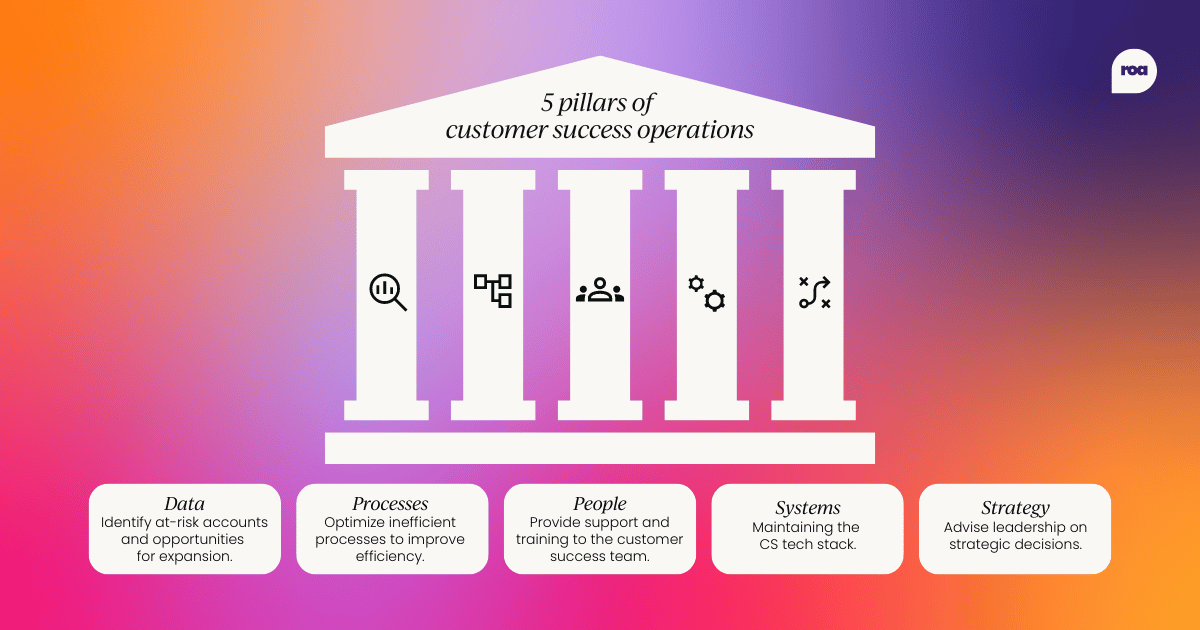Customer success operations is a new business function that aims to support the customer success team with operational tasks and enablement initiatives.
This role is crucial in helping customer success teams scale alongside your organization’s customer growth. This operations team supports your internal team by increasing task efficiency, providing data analytics, and creating customer success training programs.
Want to learn more about how customer success operations can benefit your organization? This article covers:
- What customer success operations is
- The 5 pillars of CS ops
- Why it’s important
- The signs you need a CS ops team
- How to measure customer success operations
- The role of a customer success manager
- CS ops vs RevOps
What is customer success operations?
Customer success operations (CS ops) is a strategic function that aims to increase your customer success team’s productivity and effectiveness. CS ops achieve this by optimizing processes, managing technology, and analyzing data, ultimately leading to improved revenue growth.
Put another way, customer success operations takes over the operational burden from your customer success team and allows them to spend more time on what they do best – keeping your customers happy and engaged.
CS ops look to optimize processes to streamline your customer experience, for example, facilitating frictionless renewals and creating a smooth onboarding process. The function can also make this easier for customer success managers by automating manual tasks in these workflows.
Overall, customer success operations aims to support your customer success function, improve your customer experience (CX), and increase revenue growth (through account retention and expansion).
“CS ops roles have the mission of driving productivity, consistency, efficiency, and scale across CS orgs. Those goals manifest into managing the processes, tools, reporting, and some new initiatives for CS teams.
“As gross and net revenue retention become a big focus area for all sorts of organizations, building in an operational infrastructure behind a powerful CS team lets the company drive positive outcomes.”
– Phil Kowalski, Manager, Customer Success Strategy & Operations at Hubspot

5 pillars of customer success operations
At its core customer success ops can be broken down into five key pillars of responsibility: data, processes, people, systems, and strategy.
Data
Data is essential for predicting churn and informing business decisions in customer success. Your customer success operations team will track and monitor a range of data sources to keep your CS team informed about key trends in customer usage.
Some of the data sources CS ops monitor are:
- Product usage metrics
- CRM interactions
- Financial performance
- Third-party information
This data can help to identify at-risk accounts, opportunities for expansion, and customer feedback that can be actioned. Or monitor customer health scores to spot trends in satisfaction.
By analyzing and presenting this data to management, customer success leaders can take informed action to improve CX and retain high-value customers.

Processes
As we’ve mentioned, a huge part of CS operations is optimizing processes and saving your customer success managers time.
The operations function looks out for inefficient processes that could be adjusted to allow your customer success team to be more productive. This includes implementing more effective customer engagement strategies, onboarding new technology to support efficient workflows, and automating time-consuming manual tasks.
Optimizing your customer success workflows allows your team to do more with less, and provides your customers with a better experience (as they aren’t waiting too long for a response). This helps to retain more happy customers.
CS operations also streamline the renewal process, to make it easier for customers to continue purchasing from your organization. This reduces drop-off in the renewal cycle and leads to increased revenue.
People
Sales enablement is a huge topic at the moment – but your customer success team also deserves dedicated training programs and coaching.
Customer success operations (alongside revenue enablement) works to provide up-to-date product information, customer success training, and relevant certifications to your CS team.
CS ops can also advocate for more support and headcount for your customer success team. If your CS team is swamped and needs more headcount or budget to keep up with your organizational growth, the operations team will champion this need and gain that vital buy-in from leadership.
Systems
Your customer success team will utilize a lot of tools to help them get the job done – but who’s checking to ensure those tools are working as intended?
Customer success operations, of course!
CS ops are also tasked with maintaining any and all tools within your customer success tech stack. From your CRM to your customer success platform – operations will ensure your tools work together seamlessly.
Some tasks associated with this pillar are:
- Maintaining tools and automation to ensure they work as intended.
- Assessing if a tool is sufficient, or if another tool might be better suited.
- Vetting and onboarding new tools as required.
- Integrating new and existing tools.

Strategy
The last pillar of customer success operations is strategy. Your ops function will work with customer success leadership to adjust the customer success strategy and build out their own CS operations strategy.
This will involve discussing data gathered by the operations team to help inform the next steps. For example, if data shows customers who receive a longer onboarding email series are 85% more likely to renew their account, this strategy should be rolled out across the organization.
Strategy can also include customer success account allocation. Grouping accounts by certain characteristics can allow your CS reps to get a better understanding of the customer group they serve.

Why is customer success ops important?
There are a whole host of reasons why customer success operations is important for scaling your business and keeping your customers happy.
Let’s explore a few of them:
- Improves efficiency by enhancing processes, automating workflows, and managing change – saving your CS reps time.
- Scale processes and tech. As your business grows, complexity makes it difficult to scale effectively. Your ops team can manage your processes and tools to scale with ease.
- Utilize the best tools. We all know that some tools are just better than others – your CS operations team work tirelessly to ensure your customer success tech stack is best in class.
- Better insights into customer data by aligning with sales ops and marketing ops, and taking insights straight from your CRM. Your CS ops team will have all the insights you need to make informed decisions.
- Buy-in from leadership. Customer success operations will champion the CS team’s needs to leadership – gaining buy-in for increased headcount or a new tool (whatever it takes for CS to thrive).
- Training and enablement to ensure your customer success team is always on the top of their game and up to date on the latest CS trends.

When do you need a CS ops function?
It’s not always clear when your organization needs to hire a customer success operations manager, as all companies grow and scale differently. But some telltale signs that you may need a CS ops function are:
Not enough time in the day
When your customer success team is at full capacity from day-to-day customer requests and maintenance, it’s likely time to implement an ops team to support them. This means they can strategically manage and retain customer accounts, rather than firefighting customer communications.
Can’t get the right data
If it’s difficult to get the customer data your team needs to make decisions, due to silos or another barrier, a cs operations hire is a valuable addition. They can gather, analyze, and present that data for you – so you can have the information you need quickly.
Tools don’t work effectively
If your tech stack is outdated, doesn’t work properly, or your whole team avoids using a certain tool, it might be time to bring in an operations professional to help. CS ops can manage, vet, and integrate your tech stack to increase your team’s productivity and satisfaction.

Lack of support
Does working in customer success feel like being the odd one out in your revenue organization?
When your CS function is undervalued by leadership your customers will start to feel the effects. An operations function can provide data, insights, and support to your customer success team and help to gain buy-in from leadership on budget requests.
When RevOps is implemented
Adam Schifferli, Head of Customer Success & Professional Services (Americas) at Bloomreach, thinks implementing CS ops should happen after revenue operations has been implemented at your organization.
“The CS ops role begins to make more and more sense as teams try to adjust to a lower touch cadence strategy, as the ‘Ideal Customer Profile’ begins to emerge from data, or a RevOps strategy is adopted.
“These are different drivers for the same cause, answering the question of how to enable current state teams to deliver higher & repeatable results with scalable elegance.”
Pays for itself
Another factor to consider when considering implementing customer success operations is cost. But at a certain revenue milestone, a new operations hire will essentially pay for themselves in improved efficiency.
How to measure customer success operations
The success of your customer success operations team can be measured in a few ways. One approach is to measure how much customer success metrics improve over time. These metrics could be:
- Increased customer lifetime value (CLV)
- Decreased customer acquisition costs (CAC)
- Decreased customer retention costs (CRC)
- Increased net revenue retention
Another approach to measuring CS ops success is by considering the efficiency of your customer success team over time. This could include measuring the time to do a certain activity, such as respond to a customer query.
“I try to look at the 'efficiency' of various teams, for example $/CS. Then work out how to make them more efficient.
“I also try to improve “time to do x”. Like how long does it take a CS person to review an account. Can we improve that so they can handle more accounts?”
– Brendan Pfahlert, Revenue Operation Manager at FileInvite.

What does a customer success operations manager do?
On the day-to-day level, a customer success operations manager is responsible for many tasks, such as:
- Managing tools to ensure they work as intended.
- Automating repetitive manual tasks.
- Optimizing and documenting customer success processes.
- Monitoring the CRM for signs of churn and other customer insights.
- Collating and analyzing customer feedback.
- Setting up customer success training initiatives.
- Reporting on customer success metrics.
- Assisting with customer success strategy.
However, these responsibilities vary from organization to organization. Some customer success managers may also take on some operations tasks part-time to support their team at a smaller organization.
Customer success operations vs revenue operations
It’s okay, we know you want to ask: What’s the difference between customer success operations and revenue operations?
Great question.
Customer success operations is just one aspect of the revenue cycle and, therefore, only one part of revenue operations.
While CS ops focuses on improving the customer success functions efficiency and effectiveness to increase customer satisfaction, RevOps works across the entire revenue team to improve processes and increase revenue growth.
Put another way, customer success ops when joined by marketing operations and sales operations make up the basis of an entire revenue operations strategy. CS ops is a part of RevOps.

TL;DR
- Customer success operations is a strategic function that aims to support your customer success team members.
- CS ops is based on five pillars: data, processes, people, systems, and strategy.
- Some reasons you might need a CS ops function include: when your CS team is bogged down with day-to-day tasks, when you can’t get the data you need, and when there’s a lack of support for CS initiatives.
- Measure customer success operations by tracking improvements in CS metrics and reductions in time to do certain key tasks.
- Customer success operations is one aspect of revenue operations. RevOps also covers marketing operations and sales operations.


 9 min read
9 min read
 Follow us on LinkedIn
Follow us on LinkedIn




